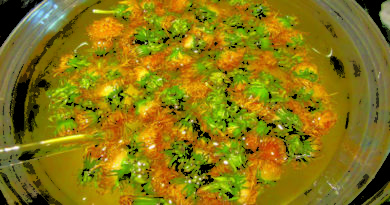Easy herbal teas for allergy relief
By Rebecca Mullins, RHN
While most people enjoy the spring and summer sunshine, for those who suffer with hay fever, these seasons can be difficult. Allergies can cause a great deal of discomfort, but by using some simple herbal teas, you can find relief from the symptoms of hay fever and other allergies. Ideally, it is best to use herbal remedies as a preventative measure leading up to spring and summer, rather than only treating the symptoms as they appear.
Chamomile Tea
Chamomile tea can be used to reduce the duration of hay fever attacks. It is rich in anti-inflammatory agents and is gentle enough for children to use. While drinking this soothing, mild and delicate tea is encouraged, another way to make use of it is by making a simple eye compress.
In ancient times, herbalists noted how the appearance of some plants resembled parts of the human body. They applied this observation to chamomile, which they said looked similar to the eyes. Since one of the worst symptoms of hay fever is itchy, red, sore eyes, a natural alternative to over-the-counter eye drops is a chamomile tea eye compress. It has a cooling effect that can soothe swollen red eyes caused by hay fever.
Make a chamomile tea eye compress:
* Make a cup of chamomile tea and allow it to cool
* Soak a wad of cotton material in the tea
* Gently place over the eyes for 5 to 10 minutes
* Can be safely used three times or more per day
* Always use a fresh compress for each eye to avoid infection
* Homemade remedies should not be kept for more than a day, since they have no natural preservatives and may introduce bacteria to the eye
Eyebright Tea
Eyebright tea, in addition to soothing the itchy eyes associated with hay fever, is also known for its ability to relieve nasal congestion. It is an astringent that dries secretions and calms inflammation of the mucous membranes of the head, throat and upper respiratory tract. It also has the ability to constrict conjunctival and nasal blood vessels when they are in a reactive state. Used internally, two to three cups per day is recommended. It is odorless and has a bitter, salty taste.
Licorice Root Tea
Licorice root tea should be taken daily for a month or so before and then also during the hay fever season for best results. There are substances in this herb, which have the ability to stimulate the adrenals to produce more cortisol, a hormone that decreases inflammation. For those who want a more natural remedy without ill side effects, this is slower and gentler on the body, which makes it a good replacement for corticosteroid drugs. However, consumption should be stopped for one month out of every four so that cortisol levels don’t become too high.
The medicinal use of licorice root tea dates back thousands of years. It contains glycyrrhizic acid, which is 50 times sweeter than sugar, which adds a nice sweet taste to the tea. Important: In susceptible people, licorice root tea can raise blood pressure or lower potassium levels; therefore, it is best to check with your health-care provider before consuming licorice root tea to ensure that it is suitable for you. It is recommended that you consume no more than three cups a day. Be sure to look for organic licorice root tea in its natural form, which can be purchased from your health food store.
Nettle Tea
Nettle tea, made from fresh stinging nettles, contains chlorophyll and formic acid, which strengthen the immune system in preparation for the hay fever season. It is also effective in reducing hay fever because it acts as an expectorant and also reduces sinus inflammation. It also acts as an effective antihistamine and an astringent to reduce itchy eyes and sneezing. Nettles are known as one of the great botanical blood cleansers, aiding the body in ridding itself of accumulated toxins, and contain many healthy minerals for our overall health. You can take several cups of strong nettle tea daily – mix with peppermint leaf to improve the taste, which is strong, grassy and earthy.
Rebecca Mullins is a registered holistic nutritionist in Northern Ontario, Canada.




